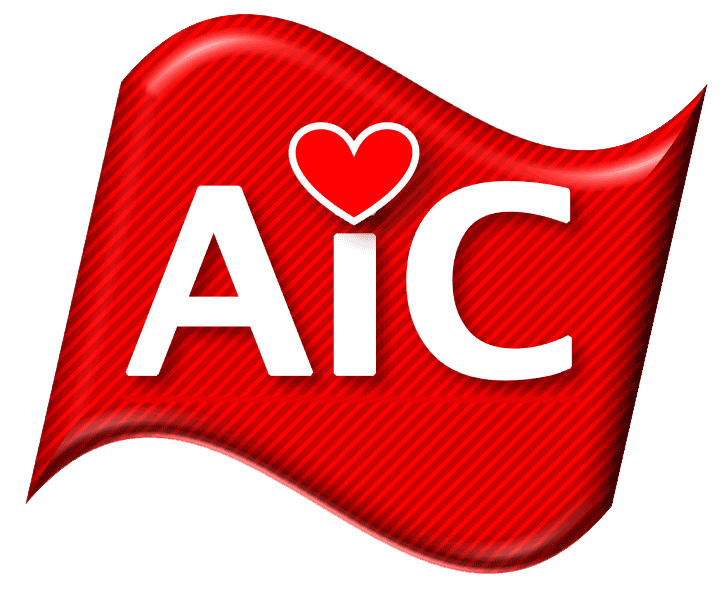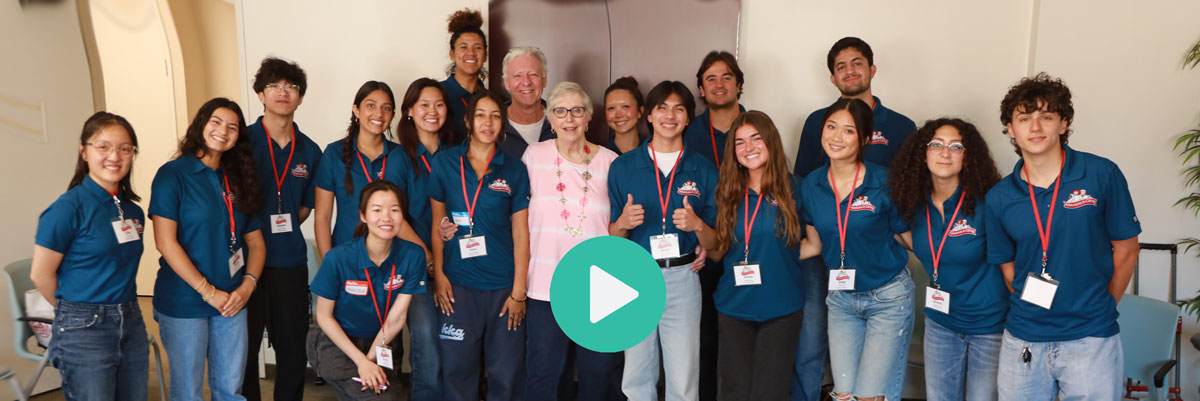Student Volunteer Action
Deliver the Medicine of Compassion
The Medicine of Compassion is a one-year service-learning internship in relationship-centered care—for undergraduate students who are pursuing careers in the health professions. It’s more than volunteering. You build a powerful communication skillset while befriending socially isolated seniors in local skilled nursing, assisted living and low-income housing units.
If you would like to make new friends, open your heart, gain the satisfaction of helping someone in a time of need—while learning the language of healing—consider becoming an Adventures in Caring volunteer intern.

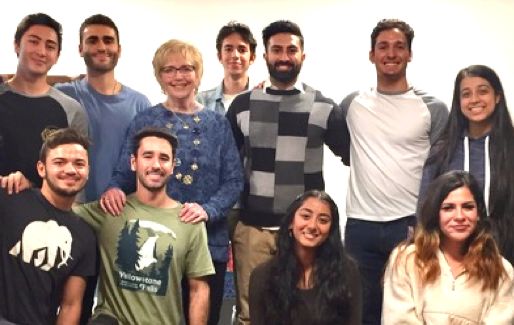
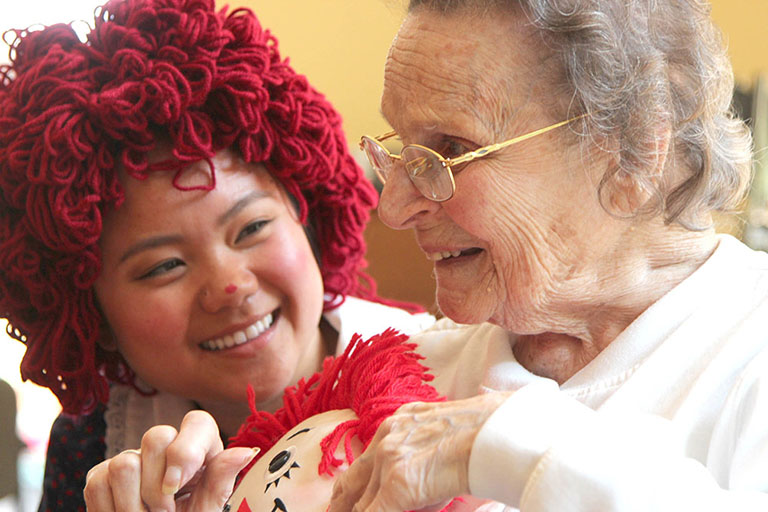
Comments from Adventures in Caring Alumni
The Adventures in Caring program taught me how to console people when they are at their most vulnerable. In the Emergency Department, we only have a few seconds to develop rapport and earn the trust of our patients. Because of my experience as a Raggedy, I have excelled at this and have become known for my ability to put even the most agitated patients at ease.
Being a Raggedy volunteer for two years was an invaluable experience in preparing me for clinical encounters. Patients sense that I really care about their problems and suffering, and often thank me for my attention and respect. The communication skills I learned have already helped me negotiate many awkward questions about health habits, and to transform the physical exam into a learning experience for patient and practitioner alike, rather than something dehumanizing.
Practicing compassion with the Adventures in Caring program has been the greatest gift. When treating patients from diverse backgrounds I see how compassion helps bridge cultural differences. Having the Raggedy experience was priceless.
Expressing compassion, the ability to listen, and learning the right words to say in moments of extreme emotion are the most valuable skills that you can gain as a Raggedy and use as a medical student. There is a definite difference between those who have experience spending time and listening to patients and those who do not.
Adventures in Caring gave me the tools I needed to become a physician who can provide the extra empathy that is so often missing in medicine today.
Being a Raggedy has taught me a life skill that has penetrated all areas of my life. I experience emotion more honestly, listen more intently, and communicate more clearly. I am a better friend, daughter, sister, and certainly a better provider because of my experience with Adventures in Caring.
I learned how to approach a patient, have an open conversation, care for someone who is suffering and/or dying, interact with a patient’s family, and how to care for myself. I will never forget the first time in my general surgery residency that I had to tell a family that their loved one died traumatically. I will never forget the words I used, how I was shaking inside, the look on their faces, or the sound of their cries. Since that night, I’ve told countless others that their loved one has passed, or likely won’t survive the evening. And while it gets easier choosing my words and I don’t shake anymore, it still stays with me. What I fall back on when I feel like I don’t know what to say or do are the principles I learned as a Raggedy.
The Medicine of Compassion
A Service-Learning Internship
in Relationship-Centered Care
Febuary 2023 Trainees & Training Assistants
Adventures in Caring offers a one-year service-learning exploration of the human element in health care, for undergraduate students who are pursuing careers in the health professions.
In-depth training, personal interactions with the chronically ill and injured, regular reflection, and year-round coaching develop the advanced listening skills, emotional intelligence, and authentic compassion so vital to healing. Such competencies reduce distress, relieve social isolation, and restore well-being—for hundreds of frail, socially isolated elderly patients in local skilled nursing, assisted living and memory care units.
You will be immersed in a best practices adult learning experience that produces real transformation in your ability to communicate with anyone—regardless of age, illness, race, or culture.
From your year of service you will gain skills that last a lifetime—you will learn the language of healing. It is no small thing to form healing partnerships and restore well-being simply by the way you communicate. This is the true art and practice of compassion.
What does it take?
Prerequisites for this program are an unusual combination of wholeheartedness, humility, and the courage to step out of one’s comfort zone. This internship is not about you or your resume looking good—it is the practical application of depth psychology to alleviate human suffering.
The language of healing uses symbolism, paradox, metaphor, and appreciative listening to draw out the stories that lead to healing—of body, mind, heart, and soul.
We have used a make-believe character to get closer to what is most real in life—this the Raggedy paradox. People in pain find it easier to speak about things closest to the heart with an anonymous, humble and friendly confidante who happens to be an excellent listener.
Social support is not the same as merely being in the presence of others. The critical issue is reciprocity: being truly heard and seen by the people around us, feeling that we are held in someone else’s mind and heart. For our physiology to calm down, heal, and grow we need a visceral feeling of safety. No doctor can write a prescription for friendship and love: These are complex and hard-earned capacities.
It is precisely these “complex and hard-earned capacities” that are developed in future doctors, nurses and allied health professionals during this one year program.
Commitment
- Two hours per week for one school year (excluding breaks)
- One visit per week, in person, to a skilled nursing, assisted living or memory care unit.
- During the visit you will interact with several patients.
- Weekly reflection on your visits continues to build your skill and insight throughout the year. Like learning any language, it takes a year to become proficient.
- Applicants are selected by interview (max 12 per training)
- If selected, you attend a 17-hour experiential training program prior to being assigned to your facility.
- All volunteer training seminars conducted in-person on a Friday evening (6–9PM), all-day Saturday (9AM–6PM) and half-day Sunday(11AM–5PM) in Santa Barbara.
- Next training dates: January 23-25 and April 17-19, 2026
- Apply here: Internship
Volunteer, Umar Anwar Saeed speaks of his experiences.
A note about the founder of the program.
Students are fortunate to learn the methods of a master communicator, Karen Fox. Karen grew up in Ethiopia, Iraq, Italy and the U.S. She spoke Italian, French, Aramaic, Arabic, and English. By age 12, Karen had already spoken with Emperor Haile Selassie, interacted with ambassadors, princes, and shamans, and brought comfort to lepers and the dying. Karen has suffered a lifetime of ill-health and injury, surviving cancer and other life-threatening illnesses. She knows full well what patients go through. She has the gift of being able to connect with everyone, regardless of circumstances, culture, religion, language, age, ability or disability, wealth or poverty. This is the gift that is passed on to everyone who participates in this program.
Learn the Language of Healing
This is the language that makes healing possible. It is active in the healing of trauma, illness, and relationships. In patients, families, and caregivers.
This is what we teach.
It takes a year to learn this language well enough to remember it for life, and to be fluent enough to alleviate distress and restore well-being. After one year you will be capable of restoring the elements of well-being that make life worth living, even for those who are seriously ill or injured, even at the end of life.
The language can be taught—we have done it successfully for thirty-five years—but it cannot be taught by lecture or learned by memorization. It can only be learned in the service of others who are suffering.
This healing language is crucial to the quality of relationships, not only in health care, but in public. We desperately need conversations that are healing rather than divisive, conversations that produce insight rather than merely affirm the latest fashion in group-think. We need language that leads to conversations that are meaningful, open, honest, and life-affirming, rather than those that are superficial, censored, devious, and corrosive. We need language that unlocks our innate capacity to heal, to grow, to thrive.
AiC student interns build proficiency in this language by engaging in healthy, constructive conversations with people who often hold diametrically opposite points of view on politics and religion. You will interact with people four and five times your age, who grew up in different countries, with a different cultures and different races, speaking different languages, believing different creeds—and who are also having difficulty hearing, seeing, or speaking, and are in pain—and you will become able to produce deeply meaningful, healing, life-affirming interactions. That is why we consider the skills you learn advanced.
We hope you will join us on this adventure—it is truly a step beyond the comfort zone, and yet that is exactly how to gain experiences and a capacity to communicate that you never dreamed possible.


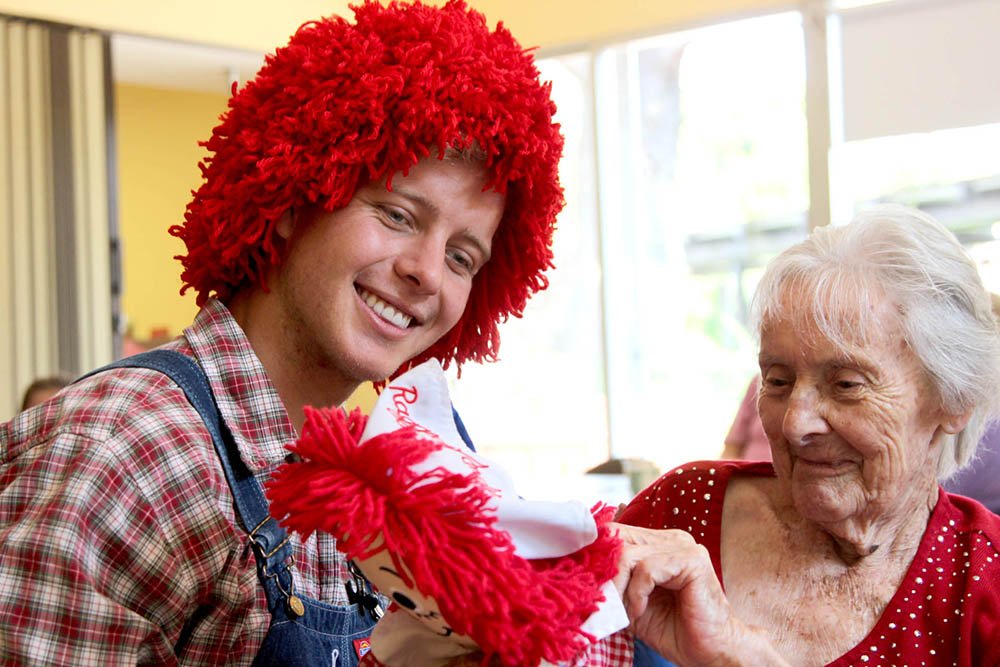
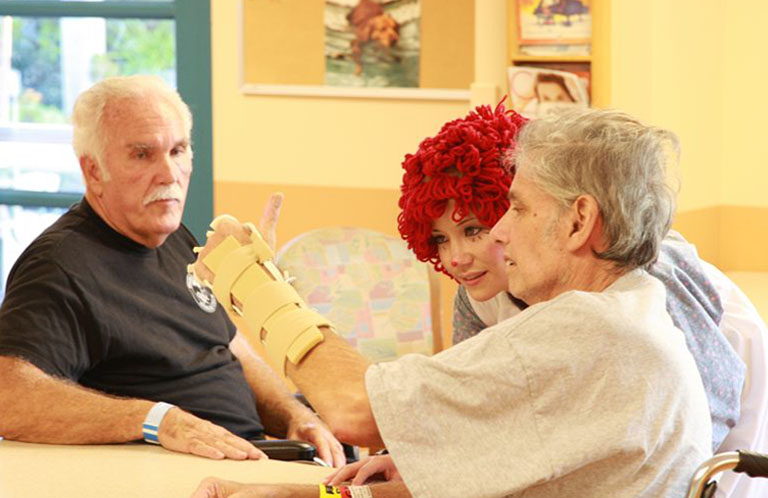

Thirty-five years of pioneering work in the human side of health care by the AiC team has produced a reliable methodology for teaching the art and practice of compassion.
How We Build Well-Being
Volunteer interns interact with residents in ways that deliberately build well-being in all seven domains described in the research paper by Fox et al. (2005) called The Eden Alternative Domains of Well-Being.
1 – Identity:
Stories are heard in depth, and the residents’ lives are known well. The interactions focus on whatever is most important or interesting to the resident at the time. AiC volunteers fortify individuality by appreciating each resident’s strengths and what makes them unique.
2 – Connectedness:
Common ground is established across generations, cultures, and interests. Experiences and stories are shared, sometimes in words, sometimes just in body language. Residents are befriended and become closely connected with enthusiastic young people in life-affirming conversations, for a year or more.
3 – Security:
Trust is built. A safe space is created to speak of things that are close to the heart. Dignity is preserved. Respect is shown. Experiences are validated. Life history is honored.
4 – Autonomy:
Choices are given often. Residents have permission to speak freely and confidentially about anything at all. They are never “shushed.” They choose whether or not to even have a conversation, and if they do, residents control the topic and length of conversation throughout.
5 – Meaning:
Insights are gained. Memories cherished. Blessings counted. A resident’s contribution and purpose in life is acknowledged. Oral history and the wisdom of elders is passed on. Residents have the opportunity to share with young people what they have found to be most important in life.
6 – Growth:
New perspectives are encountered across the generations. New depths plumbed. Forgiveness is found. Sorrow embraced. Discoveries are made. Horizons expand and experience is enriched even for the room bound.
7 – Joy:
Moments of joy and genuine companionship are experienced. Number of smiles increase. Residents have something meaningful and joyful to look forward to—hope is renewed.
